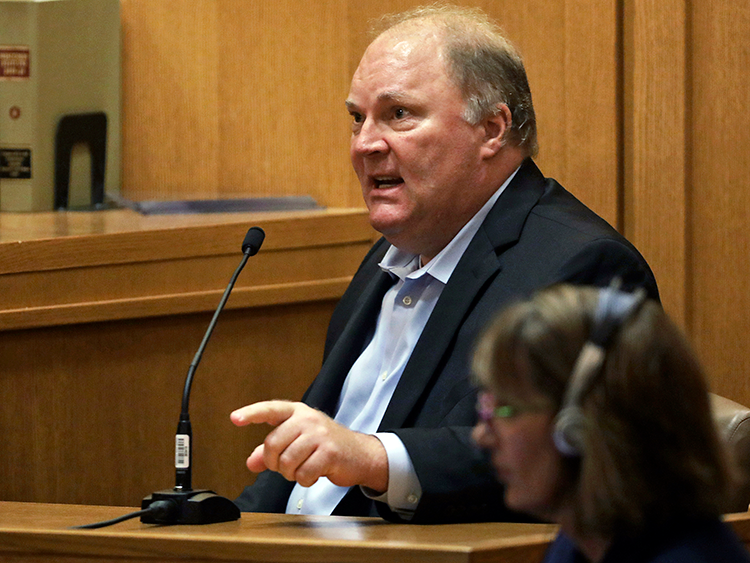Oklahoma inmate dies of heart attack after botched execution; second scheduled execution postponed
Updated: An inmate died after his execution at the Oklahoma State Penitentiary in McAlester was botched, and the second execution also scheduled for Tuesday evening has been postponed.
Witnesses say that Clayton Lockett kicked and grimaced and lifted his head from the gurney to which he was strapped in reaction to the execution drugs, Tulsa World reported. Sixteen minutes into the execution, the department of corrections closed the death chamber blinds to the media and other observers, and Department of Corrections Director Robert Patton was on the phone for several minutes before calling a halt to the execution and issuing a 14-day stay for the execution of Charles Warner, according to Tulsa World and the Associated Press. Patton characterized the problem as a vein failure. Lockett was pronounced dead of a massive heart attack at 7:06 p.m.—43 minutes after the process began, Tulsa World reported.
“It was extremely difficult to watch,” Lockett’s attorney, David Autry, told the Associated Press afterward. Autry and fellow Lockett attorney Dean Sanderford were the only witnesses present in the death chamber, Tulsa World reported.
While the ABA takes no position on the death penalty or in Lockett’s particular case, “Tuesday’s events were inconsistent with the U.S. Constitution’s requirement for meaningful due process and its prohibition on cruel and unusual punishment,” ABA President James Silkenat said in a news release. “The U.S. Supreme Court permits executions only when they do not present a substantial risk of pain and suffering. Given the circumstances Tuesday night, there appear to be abundant reasons for concern that this standard was not met. Oklahoma should not attempt to execute another prisoner until a robust, independent investigation of Mr. Lockett’s execution has been completed and steps are taken to prevent another occurrence of this kind.”
Lockett was sentenced to death for killing a woman during a home invasion burglary in 1999. Warner, meanwhile, was sent to death row for raping and murdering an 11-month old girl in 1997.
The inmates’ attorneys had challenged the state’s execution-secrecy law, which hides the identities of those who supply and administer lethal injection drugs. According to Tulsa World, several states have passed similar laws in response to a shortage of lethal injection drugs. Tulsa World states that the Tuesday executions were to be carried out with a new drug combination that has not been used in executions before. The inmates would receive midazolam, a sedative, vecuronium bromide, a muscle relaxant that stops breathing, and potassium chloride, which stops the heart.
Initially, the inmates were successful in challenging the execution-secrecy law. In March, an Oklahoma County judge ruled that the law was unconstitutional, and the Oklahoma Supreme Court stayed the executions. Gov. Mary Fallin argued that the Supreme Court had acted outside of its authority, and the Supreme Court ultimately dissolved its stay, finding that the secrecy law was constitutional.
“Tonight, in a climate of secrecy and political posturing, Oklahoma intends to kill two death row prisoners using an experimental new drug protocol, including a paralytic, making it impossible to know whether the executions will comport with the Eighth Amendment’s ban on cruel and unusual suffering,” said Madeline Cohen, attorney for Charles Warner, in a statement published by Northwest Public Radio and issued before Lockett’s execution began. Cohen also decried Fallin’s actions, as well as those of others in the state government. “Following an unconscionable 48-hour period of political intimidation, including the Governor attempting to override the Court’s stay of execution, and the introduction in the Oklahoma House of Representatives of articles of impeachment against the Justices who voted for the stay, the state’s highest court rescinded the stays,” said Cohen. “In a more appropriate political climate, Oklahoma’s Supreme Court could have taken a thorough look at this secrecy and ensured that all laws were carefully followed. Instead, we will never know.”
According to Tulsa World, this is not the first time Oklahoma has scheduled multiple executions on one day. However, the last time it happened in the state was in 1937.
See also:
ABAJournal.com: “Nationwide lethal-injection drug shortage forces states to experiment with executions”
Last updated May 1 to include link to subsequent coverage.



